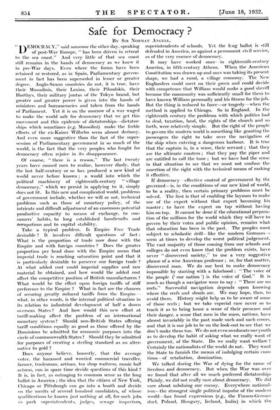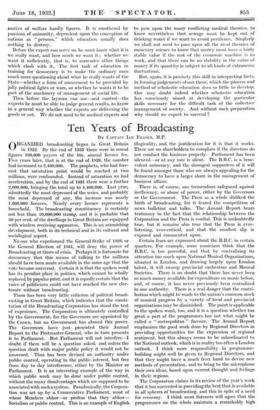Safe for Democracy ?
IAN ANGELL.
By Sin NOR) " rtEMOCRACY," said someone the other day, speaking I, of post-War Europe, " has been driven in retreat to the sea coast." And very little of that sea coast still remains in the hands of democracy as we knew it in pre-War days. Even where the forms have been retained or restored, as in Spain, Parliamentary govern- ment in fact has been superseded in lesser or greater degree. Anglo-Saxon countries do not, it is true, have their Mussolinis, their Lenins, their Pilsudskis, their Horthys, their military juntas of the Tokyo brand, but greater and greater power is given into the hands of ministers and bureaucracies and taken from the hands of Parliament. Yet it is on the morrow of a war waged to make the world safe for democracy that we get this movement and this epidemic of dictatorships—dictator- ships which sometimes (e.g. Mussolini) make the feeble efforts of the ex-Kaiser Wilhelm seem almost derisory. And even more suggestive than the fact of the super- session of Parliamentary government in so much of the world, is the fact that the very peoples who fought for democracy often rejoice in its disappearance.
Of course, " there is a reason." The last twenty years have caused men to realize, however dimly, that the last half-century or so has produced a new kind of world never before known ; a world into which the political machinery of eighteenth-century " village democracy," which we persist in applying to it, simply does not fit. In this new and complicated world, problems of government include, whether we will or not, technical problems such as those of monetary policy, of the intricate and difficult adjustment of an enormous potential productive capacity to means - of exchange, to con- sumers' habits, to long established handicrafts and occupations and to capital stability.
Take a typical problem. Is Empire Free Trade desirable ? It involves difficult questions of fact : What is the proportion of trade now done with the Empire and with foreign countries ? Does the greater proportion per head done with the Empire mean that imperial trade is reaching saturation point and that it is particularly desirable to preserve our foreign trade ? At what added cost could imperial supplies and raw material be obtained, and how would the added cost affect the competitive position of British manufacturers ? What would be the effect upon foreign tariffs of stiff preference to the Empire ? What in fact are the chances of securing greatly reduced tariffs from the Empire— what, in other words, is the internal political situation in its relation to industrial development of half a dozen overseas States ? And how would this new effort at tariff-making affect the problem of an international monetary system? Should non-British States offering tariff conditions equally as good as those offered by the Dominions be admitted for economic purposes into the circle of commonwealth States? Should they be admitted for purposes of creating a sterling standard as an alter- native to gold ?
Does anyone believe, honestly, that the average voter, the harassed and worried commercial traveller, farmer, tradesman, artisan, tea shop waitress, music hall actress, can in spare time decide questions of this kind ? It is, in fact, as outraging to common sense as the long ballot in America ; the idea that the citizen of New York, Chicago or Pittsburgh can go into a booth and decide on the merits of several hundred candidates, of whose qualifications he knows just nothing at all, for such jobs as park superintendents, judges, sewage inspectors, superintendents of schools. Yet the long ballot is still defended in America, as against a permanent civil service, as of the very essence of democracy.
It may have worked once—in eighteenth-century America, in fifth-century Athens. When the American Constitution was drawn up and ours was taking its present shape, we had a rural, a village economy. The New Englanders could meet on their green and could decide with competence that William would make a -good sheriff because the community was sufficiently small for them to have known William personally and his fitness for the job. But the thing is reduced to farce—or tragedy—when the method is applied to Chicago. So in England. - In the eighteenth century the problems with which politics had to deal, taxation, land, the rights of the church and so forth, were relatively simple. But the right of the people to govern the modern world is something like granting the Passengers the right to take over the navigation, of the ship when entering a dangerous harbour. It is true that the captain is, in a sense, their servant ; that they are the ultimate masters ; that they pay the piper and are entitled to call the tune ; but we have had the sense in that situation to see that we must not confuse the assertion of the right with the technical means of making it effective.
If democracy--effective control of government by the governed—is, in the conditions of our new kind of world, to be a reality, then certain primary problems must be solved. The first is that of enabling the layman to make use of the expert without that expert becoming his master ; to have the expert on tap .without having him on top. It cannot be done if the educational prepara- tion of the millions for the world which they will have to govern by their votes and public opinion, remains what that education has been in the past. The peoples most subject to scholastic drill—like the modern Germans— seem at times to develop the worst political judgement. The vast majority of those coming from our schools and colleges do not even know that the problem exists, have never " discovered society," to use a very suggestive phrase of a wise American professor ; or, for that matter, discovered man. We do our best to make democracy impossible by starting with a falsehood : " The voice of the people (` our nation ') is the voice of God." It is much as though a navigator were to say : " There are no reefs." Successful navigation depends upon knowing where the reefs and shoals are. We may hope, then, to avoid them. History might help us to be aware of some of those reefs ; but we take especial care never so to teach it as to bring home a sense of their presence and their danger, a sense that men in the mass, nations, have almost invariably in the past made such and such errors, and that it is our job to be on the look-out to see that we don't make them too. We do not even so educate our youth as to develop the habit of asking what we really want of government, of the State. Do we really want welfare ? Certainly the nationalists of the world do not. They want the State to furnish the means of indulging certain emo- tions—of retaliation, domination.
We talked during the War of dying for the cause of freedom and democracy. But when the War was over we found that after all we much preferred dictatorship. Plainly, we did not really care about-democracy. We did care about subduing our enemy. Everywhere national- ism—the strongest single political impulse of the modern world—has found expressions (e.g., the Franco-German duel, Poland, -Hungary,. Ireland,. India). in which the
Motive of welfare hardly figures. It is smothered by passions of animosity, dependent upon the conception of nations as " persons," which education usually does nothing to destroy.
Before the expert can serve us, he must know what it is we really want, and how much we want it ; whether we want it sufficiently, that is, to surrender other things which clash- with it. The first task of education in training for democracy is to make the ordinary man much more questioning about what he really wants of the State—whether a form of amusement to be provided by jolly political fights or wars, or whether he wants it to be part of the machinery of management of social life.
. Then before the layman can use—and control—the experts he must be able to judge general results, to know in a general way whether the experts are delivering the goods or not. We do not need to be medical experts and to pass upon the many conflicting medical theories, to know nevertheless that sewage must be kept out of _drinking water if we want to avoid pestilence. Sim,ilarly we shall not need to pass upon all the rival theories of monetary science to know that money must have a fairly stable value if the rest of the economic machine is to work, and that there can be no stability in the value of money if its quantity is subject to all kinds of extraneous fluctuations.
But, again, it is precisely this skill in interpreting facts, in forming judgements about them, which the process and method of scholastic education does so little to develop. One may doubt indeed whether scholastic education has consciously aimed at developing the particular skills necessary for the difficult task of the collective management of society. And without such preparation why should we expect to succeed









































 Previous page
Previous page